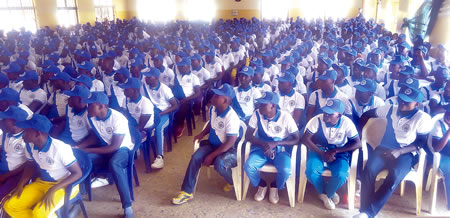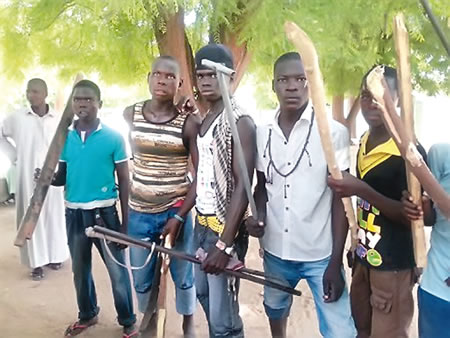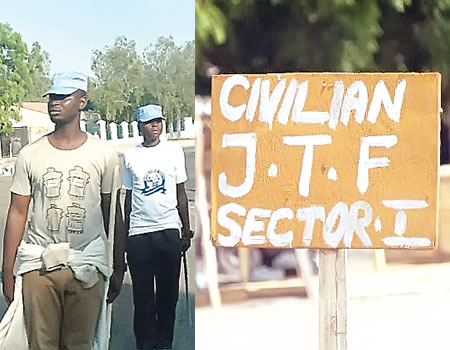
The Federal Government claimed it has won the insurgency war against Boko Haram and has thus started a programme to empower and make them independent after the insurgency might have ended. ISAAC SHOBAYO who was at the empowerment programme in Jos writes that the proramme is a multi-pronged approach.
IN the course of this year, President Muhammadu Buhari and the Army Headquarters made bold announcement that Boko Haram had been decimated and flushed out of their hideouts in Sambisa forest and other places in the North-East. The statement and/or announcement came as relief and assurance to many Nigerians, especially those in the North-East.
However, the story of the military’s success against Boko Haram is not complete without the efforts and supportive roles played by the Civilian JTF, a volunteer vigilante group. The Civilian JTF, as it came to be known in order to distinguish it from the military Joint Task Force, had no significant arms except sticks, swords, bows, arrows, and locally made guns.
Members of the group were so good that they easily fished and captured suspected members of the Boko Haram within their communities.
Initially, the military was not favourably disposed to their operations but later found them useful because they knew the local terrain very well. The pioneer chairman of Civilian JTF, one Baba Lawan Jafar, was reportedly the first youth who fearlessly chased a gunman, with only a stick in his hand, successfully captured him and handed him over to military men. This heroic act encouraged other youths to join the group.
“He was seen as a hero by quite a lot of youths in Maiduguri who later teamed up with him to form Civilian JTF. Many youths, however, died in the process, as the Book Haram in turn also moved against them. It was determination, with the backing of Allah that helps us.
“We equally serve as informants to the military. In most cases, they relied on us for information and we also serve as compass for them in very difficult terrains. Don’t forget many of our members are hunters who are familiar with Sambisa forest and other Boko Haram hideouts,” a member of the group who did not want to be named told Sunday Tribune.
As impressive as the Civilian JTF had been in their activities, the federal government felt there was need to be futuristic in planning for their post-insurgency life, so that they don’t constitute another security threat to the country like the Niger Delta militants.
As of today, some of the CJTF have been absorbed into the military and other paramilitary organisations, having been trained to handle arms and ammunition and in the art of warfare. A human rights activist, Bello Maikasuwa, who spoke with Sunday Tribune on the efforts by the federal government to empower the civilian JTF said any attempt to leave them without preparing them for the future would be counterproductive and a time-bomb for the nation.
Already governments of Borno and Yobe states had taken up some empowerment programmes including provision of land for farming and assisted them to get married. In Borno state for example, the government in 2013, in collaboration with security agencies summoned the youths and trained 1,678 of them.
The target was to train at least 20,000 of them and provide them with jobs under the programme known as Borno Youth Empowerment Scheme (BOYES).
Apart from interventions by the states and federal government, some international and nongovernmental organisations have also stepped in to help in order to strengthen the CJTF to render quality security and human rights services to their communities, increased prevention of gender-based violence and promote community cohesion and peaceful co-existence.
One of these international interventions was a capacity building programme by the United Nations Development Programme (UNDP) to train 2000 members of Civilian JTF and vigilante Groups from Borno, Adamawa and Yobe states at the Citizenship and Leadership Training Centre Jos, Plateau State, where they were exposed to leadership training and how to be responsible citizens.
Speaking during the closing ceremony of the first batch of 710 participants, UNDP Country Director Samuel Bwalya said the training would afford the beneficiaries the opportunity to acquire skills in technical and vocation al trades of choice that would enable them to live an economically and socially viable life long after the insurgency must have ended and support them with start-up equipment to establish individual businesses.

The UNDP Country Director, who was represented at the graduation ceremony by Mr. Mathew Alao, said the capacity building programme was part of the German-funded Integrated Regional Stabilisation of the Lake Chad Basin Project in four countries of Cameroon, Chad, Niger and Nigeria, added that it was in recognition of the contributions of the young men to exterminate the Boko Haram.
He, therefore, tasked the participants to make the best use of the opportunity by rededicating themselves to the progress, development and consolidation of peace in their respective areas.
Speaking with Sunday Tribune Mr. Alao said the post-insurgency programme of the UNDP is to resettle the Civilian JTF and other vigilantes after the insurgency adding that UNDP under the programme had equally trained a reasonable number of the young men in automobile repair at Peugeot Automobile of Nigeria (PAN) in Kaduna and equipped them with required tools.
A cross section of the participants who spoke with Sunday Tribune during the closing ceremony of the programme in Jos commended the UNDP for the training. Bala Ibrahim who is from Yobe State urged all state governments in the North-East to organise a similar programme that would cater for the Civilian JTF and other vigilante groups who had made sacrifices with their lives to protect others and arrest the wave of insurgency even without basic arms.
“I was among the first set that joined the Civilian JTF; many of us also died along the way because we were fighting our brothers that actually know us and we also know them. I think you can see the danger involved. It was a sacrifice and many pressed on for more than two years without looking back. There were some of us whose families were killed by the Boko Haram simply because they know we were working against their interest.
”Among our members we have graduates, artisans, traders, among others who abandoned their means of livelihoods to join Civilian JTF. Now that the insurgency is gradually dying down, there is the need for the government to put up post-insurgency settlement for us to pick up from where we stopped,” Ibrahim said.
Another participant, Ahmed Babale, who is a former primary school teacher before joining Civilian JTF said Boko Haram has been decimated to a large extent and dislodged from most of their hideouts adding that it would be dangerous for the government to allow members of Civilian JTF to go into the society after insurgency without empowering them with sustainable means of livelihoods.
“It is dangerous and could be suicidal; it is like post war era. The North Eastern state governments should emulate the UNDP or partner with this international organisation to do more for us.”
One of the female participants, Hauwa Abdulahi, said the contributions of the Civilian JTF cannot be quantified adding that she and other female members of the group work hand in hand with their male counterparts to complement efforts by the military to end insurgency.
“I was moved to join the Civilian JTF as a result of the senseless killings; some of my family members were killed without any reason. If we should fold our arms, before you know it the Boko Haram will take over. I am not regretting my joining this group but the government should come up with a package that will take care of us. Thank God, insurgency is coming to an end.” she said.
The United Coordinator of the Citizenship and Leadership Training Centre, Plateau State, Mallam Abdulmumuni Maimako, said the Civilian JTF was a child of necessity and commended the governments of Yobe and Borno states for encouraging the CJTF and giving them maximum support and encouragement in helping the military eradicate the menace of insecurity.
“Indeed, the Civilian JTF /Vigilante are doing a great job worthy of praise and emulation by youths in other states of the nation. They need to be encouraged and assisted, especially now that the Boko Haram war is coming to end,” he said.
In his address at the closing ceremony of the training, the Permanent Secretary, Ministry of Youth and Sport Development, Mr Adesola Olusade, commended the initiative of the UNDP for sponsoring the programme and for the skill acquisition programme.
He called on NGOs to emulate the UNDP while appreciating the cooperation and support of government at the state level in making the training a success.
Though the empowerment programme for the CJTF is a laudable one, sustainability is key and unless government ensures this vital part, it may run into the same problems faced by a similar one done for Niger Delta militants the ghost of which has not been laid to rest till date.






